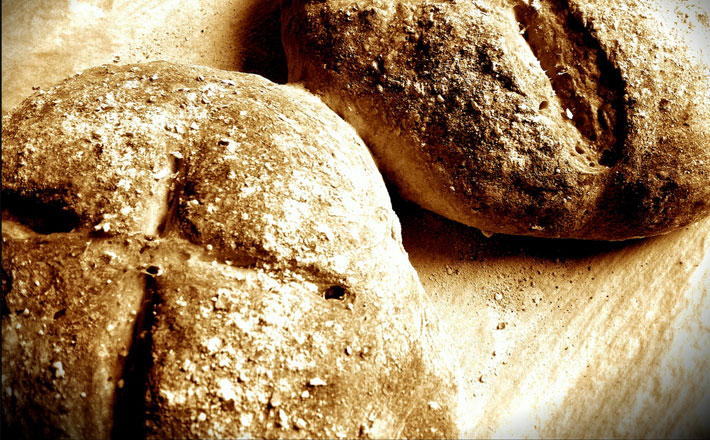Commentary on 1 Kings 19:4-8
When I was working my way through college, I was forced to take a year off to pay debts and start at a new school.1
I worked in two restaurants during that year. In the evening I worked at an elegant restaurant and in the mornings I worked at a diner. We referred to the morning shift as “slinging hash.” I was really bad at it. I am not a “morning person” to start with, and I often was up pretty late at the other restaurant, so I was definitely bumbling my way through the shifts. I messed up order after order or arrived late and was on the receiving end of a lot of short tempers.
Finally, one of the veteran waitresses who worked the counter pulled me aside. She said that it looked like I was having a lot of problems and I agreed with her. She told me that I could make a lot of mistakes during the morning shift, and they would be quickly forgiven. I could burn toast, I could be late with the food, I could get the order wrong, but the one thing I could not do is be late with the coffee. I had to get coffee to them immediately and I had to promptly refill the coffee. If I did this, all other mistakes would be forgiven. She was absolutely correct and my job went much more smoothly after this corrective. I got out of the wilderness and could proceed on my journey back to college.
Elijah literally finds himself in the wilderness in this reading, but he also seems to be figuratively in the wilderness as he asks the Lord to take his life. Elijah has endured a traumatic episode with the prophets of Baal and Asherah up in the northern region of Carmel. Although he successfully dispatched the prophets and demonstrated God’s power to Ahab, something is wrong. Elijah experiences a sense of shame or failure or some type of emotion on which we cannot quite put our finger. It leaves him deflated, despondent and depressed.
We may never know what exactly led to this situation under the broom tree in the wilderness, but I imagine we can all think of difficult situation like this. We can think of Hagar in the wilderness with her young boy, but God would not allow that situation to endure. We can think of Jonah under his own tree in faraway Nineveh, equally despondent.
The Bible presents these scenarios to us in order to highlight the travails of God’s people. Whether they be a foreign female slave, a runaway prophet, or perhaps the most famous prophet, there will be bumps in the road or perhaps chasms in the road. Our Scripture focuses on “the way.” At times that way is crystal clear. 1 Kings has previously presented Elijah as assured and triumphant. He seemed to have no problem finding his way, yet now we see a very different Elijah, an Elijah sharing more in common with Hagar and Jonah than Elisha and Isaiah. While we meet a very different Elijah here, we meet the same Lord here who ministered to Hagar and Jonah.
Elijah’s struggles with many things, but nothing more than himself. We can all probably recognize how we can be our own worst enemy. 1 Kings 19 clearly demonstrates Elijah’s demons bringing him to a standstill. Oftentimes, it is easy for us to see the source of other people’s problems. We have seen many triumphs of Elijah before this event, and we know that there will be many triumphs to follow. With all of this in mind it can be hard to understand how things went so wrong so quickly for Elijah. Yet that is part of Elijah’s story just like it can often be part of our story. We can often find ourselves most at risk, when we are feeling most invulnerable.
God sends unexpected help to Elijah during his time of great vulnerability. Elijah is able to overcome his great sadness through the care of the angels and the nourishment of their food. This story invites us to see how the Lord has been present to us in difficult moments. It also invites us to view our problems through a lens able to see God’s divine presence in the world. Just as God is clearly present to Elijah in order to help him overcome his travails, we must have the same confidence that God is present and will be present in our lives. We know the whole of the Elijah story and can see this as just a blip in the story. We must also have the awareness that our travails and troubles are far from the whole of our story. Just as God has been present in our past, we must persevere in the hope that God will be present in our future.
We find a compassionate God here sending an angel to Elijah in his hour of need, and sending an angel again to Elijah in the following verse. As God accompanies Elijah, Hagar, and Jonah on their journey, Scripture invites us to consider how God has accompanied us on our journeys. We can think of Elijah going from mountain top to mountain top on his journey from Carmel to Horeb.
Those mountain experiences are memorable and often fill us with life, especially when we have transcendent experiences of God. Yet Scripture stops here to focus on the horizontal experience rather than the vertical experience. This reading challenges us to see how God was present to us in the boring parts of our journey. Elijah teaches us to bring all our emotions to God. God will be present to us in different ways on different parts of the journey. We cannot experience the theophany of a storm cloud and deluge in the middle of the desert, but God finds a different way to be present to us. Our reading assures us that God makes the entire journey with us.
Notes
1. Commentary first published on this site on Aug. 12, 2018.


August 12, 2018